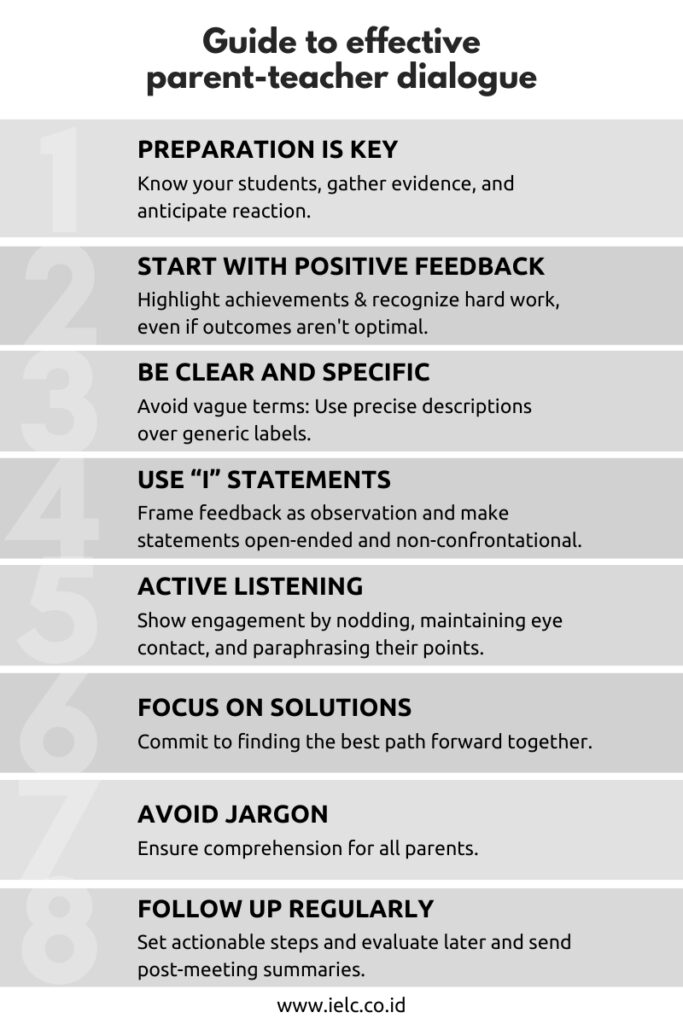
Practical guide to effective parent-teacher dialogue
Welcome, educators!
In the world of education, few things are as delicate and significant as the conversations we have with parents about their children.
We’ve all been there: searching for the right words, wanting to highlight progress while being honest about challenges, and all the while ensuring that our words reflect care, understanding, and commitment to the student’s growth.
How can educators bridge this gap, ensuring not only clarity but also empathy?
As we delve into the intricacies of these conversations, we’ll uncover strategies for compassionate communication, fostering understanding and collaboration between home and school.
We’ll explore the ways to engage in these critical conversations with empathy, ensuring that every parent feels heard, understood, and partnered with in their child’s educational journey. So, let’s get started!

1. Preparation
As teachers, we understand the importance of preparation – it’s a cornerstone of effective teaching. Similarly, when gearing up for parent-teacher meetings, a little prep work goes a long way in ensuring meaningful dialogue.
- Know your student: Before meeting with parents, spend some time reflecting on the student’s overall journey. Recognize their strengths and areas of improvement, their unique challenges, and the milestones they’ve achieved. This comprehensive understanding will allow you to discuss their progress with depth and insight.
- Gather evidence: Transparency is key. If there are specific issues or achievements to be discussed, having tangible evidence in hand is invaluable. Gather relevant work samples, grades, or other evidence that can provide context to your observations. This provides clarity, leaves less room for ambiguity, and shows parents that your observations are grounded in reality.
- Anticipate reactions: Let’s face it, no two parents are the same. While some might nod in understanding, others might react with surprise, concern, or even disbelief. Being empathetic means predicting these reactions and being ready with strategies to handle them. It’s not about being defensive, but about offering support, understanding, and potential solutions.
Remember, the ultimate goal of these meetings is not just to inform, but to collaborate. Preparation allows us to lay a strong foundation for this partnership, ensuring that the conversation is productive, supportive, and ultimately beneficial for the student’s growth.
2. Start with positives
It’s a universal truth: people are more receptive to feedback when it’s framed positively. This holds especially true during parent-teacher conferences, where the stakes feel personal and emotions can run high.
Begin the discussion by spotlighting the student’s achievements, no matter how big or small. Maybe they aced a recent project, showed improvement in a challenging area, or perhaps they’ve been a great team player in group tasks. By leading with these positive observations, you not only boost the parents’ spirits but also set a foundation of trust.
It’s important to acknowledge efforts, not just outcomes. Sometimes, even if the desired outcomes aren’t there, the effort and dedication a student shows are commendable. Recognize those efforts. It’s essential for parents to know that you see the hard work their child is putting in, even if it hasn’t translated to top grades just yet.
Once you’ve established a positive tone, parents are often more open to hearing about areas of improvement. This strategy ensures that the conversation remains balanced, acknowledging the full spectrum of the student’s experiences in your class.
3. Be clear and specific
Navigating a conversation about a student’s progress or behavior can be a delicate dance. However, while diplomacy is essential, so is clarity. Using vague or generic terms might seem like a way to soften the blow, but it can sometimes leave parents perplexed or, worse, with misconceptions.
For instance, saying “He’s disruptive” might conjure up numerous scenarios in a parent’s mind. However, stating, “I notice that he often talks to his neighbors during independent work time,” creates a vivid, tangible scenario. This not only helps parents understand the specific behavior but also steers clear of labeling the student.
Always ensure that your feedback is directed at the behavior and not at the student’s character. This distinction can make a significant difference in how parents receive and respond to your observations.
4. Use “I” statements
Feedback, especially when it addresses challenges or areas of concern, can sometimes feel like a heavy weight. It’s easy for parents to feel defensive or protective if they perceive a slight against their child. However, one simple linguistic tweak can make these conversations far more productive: the use of “I” statements.
he shift from saying, “She isn’t turning in her assignments,” to “I’ve noticed she hasn’t been handing in her assignments in my class,” may seem subtle, but it has a profound impact. The latter approach conveys an observation rather than a judgment. It centers the conversation around your own experiences with the student in your classroom, rather than making blanket statements about the student’s character or abilities.
These statements are inherently non-confrontational. They express an individual perspective rather than an absolute truth. By sharing your personal observations, you’re opening the door to a dialogue, inviting parents to share their insights or ask questions.
5. Listen actively
No matter how much experience we gather under our belts, there’s one undeniable truth: the parents know their child best. While you might see a student for a few hours a day, parents have an intricate, lifelong understanding of their child’s nuances. This makes them invaluable allies in the educational journey.
When parents share their insights or concerns, it’s essential to respond with understanding. Using phrases like “I can see how that would be concerning” or “Thank you for sharing that perspective; it helps me understand better” can validate their feelings and foster a sense of collaboration.
Remember, active listening is more than just staying silent when someone else speaks. It’s about making a conscious effort to understand and absorb what’s being shared. Nodding, maintaining eye contact, and paraphrasing or summarizing their points can show parents that you’re genuinely engaged in the conversation.
In essence, these conversations are two-way streets. While you bring your classroom observations to the table, parents offer insights from home. By actively listening and responding empathetically, you’re not only building trust but also crafting a comprehensive strategy to support the student to have the best experience possible.
6. Be solution-focused
Every educator knows that pointing out an issue is only half the battle; it’s what you do next that truly makes the difference. When discussing student progress and challenges, the conversation’s end goal should always be to find tangible, actionable steps that both school and home can take to ensure the student’s success.
Just as teachers have a wealth of strategies and tools at their disposal, parents often have their own tried-and-true methods that work wonders at home. Perhaps they’ve found a unique way to make homework engaging, or they’ve stumbled upon a technique that helps with focus. By inviting parents to share these insights, you’re pooling resources to find the best possible approach.
When parents and teachers come together with a shared goal, the results can be powerful. By keeping the conversation solution-focused, you’re sending a clear message: “We’re in this together, and we’re committed to finding the best way forward.”
In every conversation, it’s essential to remember that every party involved wants the best for the student. By emphasizing solutions and actively seeking collaborative strategies, educators can ensure that these discussions are both productive and positive.
7. Avoid jargons
Walking into a parent-teacher meeting can already be a daunting experience for some parents. Add to that a barrage of educational jargon and acronyms, and it’s a recipe for confusion. As educators, it’s our responsibility to ensure that every parent, regardless of their familiarity with the world of education, leaves our meetings feeling informed and empowered.
Just as you’d adapt your language for students at different comprehension levels, do the same for parents. Instead of saying “She’s having difficulty with phonemic awareness,” you might explain, “She’s finding it challenging to recognize and use sounds in words.”
If you know that a particular term will be essential for the conversation, consider having a mini glossary or a brief explanation at hand. This way, parents not only understand during the meeting but also have a reference for the future.
8. Follow up
At the end of your meeting, don’t just bid farewell with a hopeful “Let’s see how it goes.” Instead, set tangible, actionable steps. For instance, if you’ve decided on a new study strategy for the student, mark a date on the calendar to reconvene and evaluate its effectiveness.
Also, consider sending a post-meeting summary email or WhatsApp. Not only does it provide a clear record of what was discussed, but it also serves as a reference point for both you and the parents. Jot down the main points of discussion, the strategies agreed upon, and the next steps planned.
The beauty of follow-ups is that they aren’t just about checking boxes. They offer an opportunity to recalibrate. Maybe the strategy didn’t work as well as hoped, or perhaps there’s a new development. Regular check-ins keep the lines of communication open and adaptive.
Summary
Navigating conversations with parents isn’t always easy, but it’s undeniably essential. When we approach these discussions with preparation, clarity, and heart, we open doors to collaboration, understanding, and positive change. Because, at the end of the day, we all share a common goal: the well-being and success of the student.
Here’s to many more fruitful conversations and shared successes!
At IELC, we teach English the right way
Our goal is to get you speaking in English with fluency and confidence as fast as possible. We want to give you the skills you need to fulfil your potential!
Our experienced teachers will guide you along every step of the learning process to ensure that you are not wasting your time, money, and energy on useless language exercises & wrong methods.
Our courses
With our modern campus and technology, we are equipped to provide the best possible courses for children, teens, and adults, including:
Online and on campus IELTS courses
Online and on campus TOEFL PBT courses
Online and on campus TOEFL iBT courses
We offer our classes in group classes or private classes.
No matter what your goals are, our team will help you achieve these goals by providing you with Indonesia’s best English courses!
Talk to our team today to get your FREE consultation and take your first step towards success.
Sincerely,

IELC Academic Director
